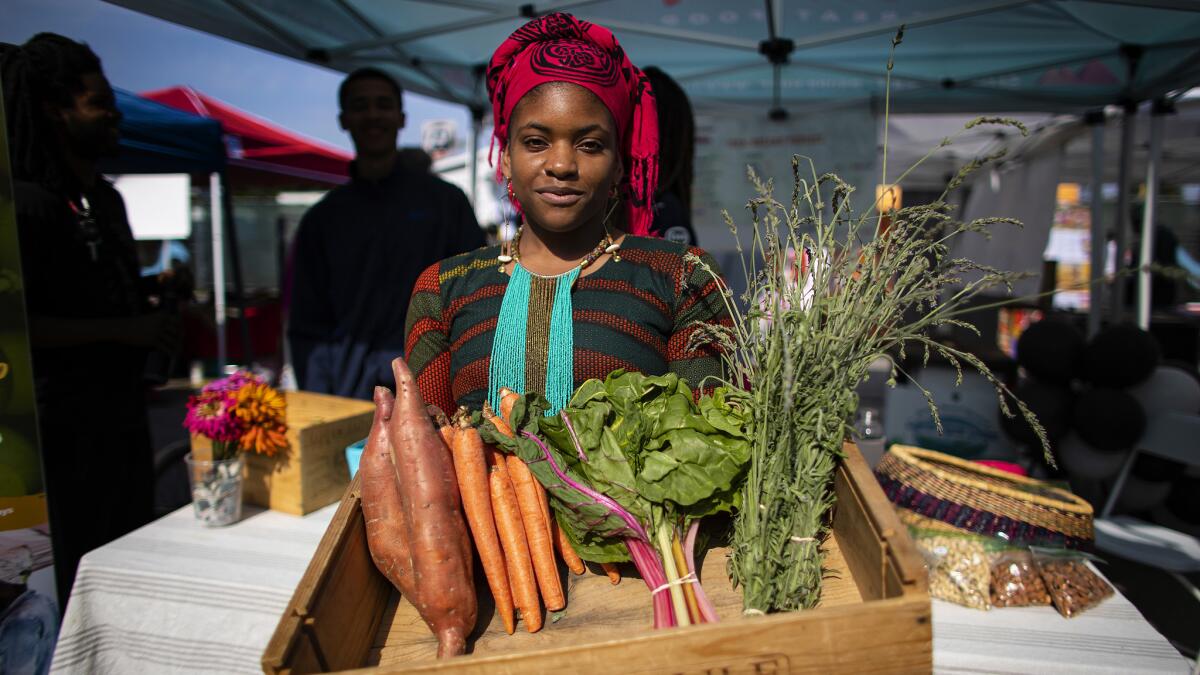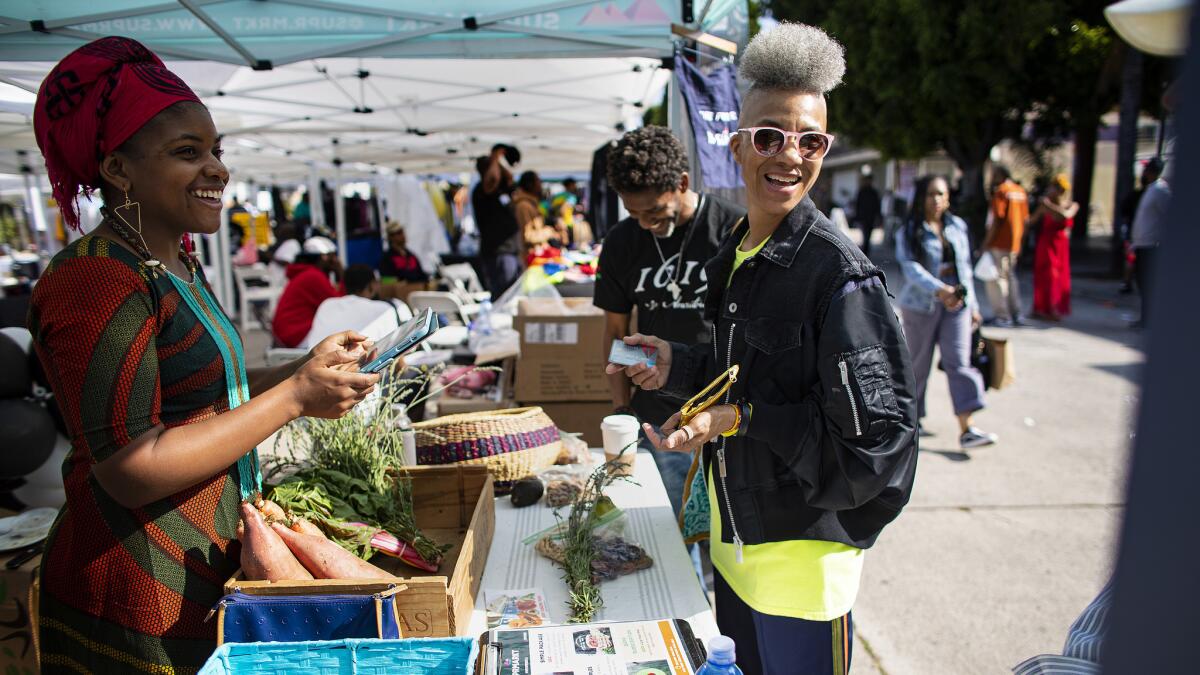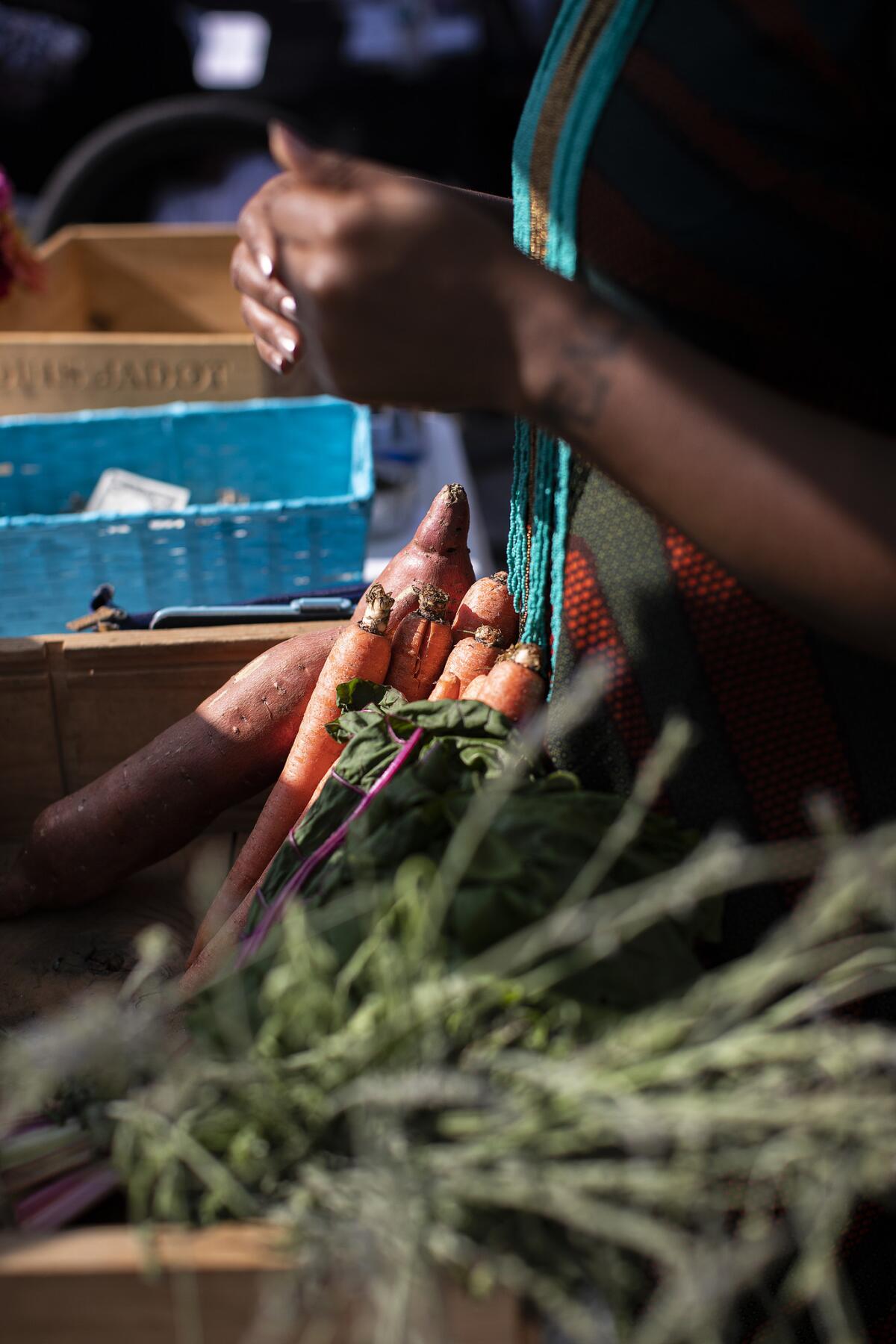A Süprmarkt for the people challenges ‘food apartheid’ in South L.A.

- Share via
“We have cilantro, basil — they’re really good for heavy metal detoxing,” says Olympia Auset as she helps a customer sift through a wooden box filled with an arrangement of green herbs and lettuces.
It is a breezy Sunday afternoon in Leimert Park in South Los Angeles. A few steps away, a drum circle reverberates. Above the table, which holds pineapples and fresh ginger root, a tent labeled Süprmarkt, Auset’s organic grocery pop-up, casts shade on the rainbow of produce below.
For the record:
4:00 p.m. July 3, 2019An earlier version of this story cited a Rand Corp. study. The study was from the California Center for Public Health Advocacy.
Since 2016, Süprmarkt has provided affordable organic produce to communities in South L.A., both with stands such as this one and a subscription-based, CSA-style produce delivery service. Subscribers can sign up on the Süprmarkt website and customize their order by dietary preferences and quantity.
Auset was motivated to start Süprmarkt as a way to combat the lack of healthful, fresh food options in the neighborhood in which she was raised.
“We really don’t have the options that we deserve to have in these communities,” she says, stressing the importance of availability of food within walking distance, especially because many residents don’t have cars.
A 2008 study by the California Center for Public Health Advocacy found a strong correlation between health problems and the ratio of fast-food and convenience stores to grocery stores and produce vendors in various neighborhoods. Counties with the highest ratios of fast-food outlets also had some of the highest rates of obesity and diabetes, the report found.
Three years ago, a decadelong deal to build a grocery store in South L.A. fell through, a disappointing setback for a region that has disproportionately fewer grocery stores per capita than in other parts of the city. Instead, the neighborhood is filled with convenience stores.
We really don’t have the options that we deserve to have in these communities, especially in a city like L.A.
— Olympia Auset
Since then, with only two employees and a few volunteers, Auset has transported more than 25,000 pounds of organic fruits and vegetables to the community in South Los Angeles. By accepting EBT, Auset offers residents who rely on public assistance easier access to fresh organic food. Süprmarkt also sells 10-day juice cleanses and offers free “scholarships” for those who qualify. Prerequisites include watching the documentary “Fat, Sick and Nearly Dead,” attending juicing meetings in Leimert Park and submitting a 200-word essay about why a juice cleanse would change your life.
Auset steps out from behind the table to hug a patron. “I’m so so proud of her,” she says, smiling as the woman tells her she has lost 33.5 pounds thanks to Süprmarkt’s juice cleanse program.

Auset also is raising money through her #KeepSlausonFresh Indiegogo campaign to buy Mr. Wisdom’s, a health food store on Slauson Avenue that closed in January. She was inspired by the late rapper and activist Nipsey Hussle, who was killed in South L.A. this year just blocks away from where she was selling fruits and vegetables. The rapper ran a local clothing store and employed people transitioning out of prison or homelessness.
After Hussle was killed in March, Auset says she and others began to have conversations about ways to better their community. Saving Mr. Wisdom’s was the answer.
She wants to make Mr. Wisdom’s a modern neighborhood “oasis” with sustainable products, plates of vegan food and groceries. She envisions it as a welcoming community space with WiFi, “a place where people can come and just feel at home, connect, enjoy themselves and learn about food and community,” she said. Since launching her campaign, Auset has raised more than $65,000 and garnered attention from the media as well as celebrities including Issa Rae and the cast of HBO’s “Insecure,” plus salad company Sweetgreen, who have backed and shared her campaign.

Auset says she gets emails from people in neighborhoods facing similar problems in Alabama, Chicago, New York and Atlanta, asking her to bring her program there. “The stereotype that it is like this because all they want to eat is fast food is ...,” she said, ending that sentence with an expletive, exasperated by false stereotyping of communities in underserved urban neighborhoods. “It’s totally not true and there are people everywhere who want this and care about this.”
Though Auset’s work centers around food, her philosophy and commitment to social justice stretches far beyond that. By shining a light on “food apartheid” — she prefers this term to “food desert,” as a “desert” occurs naturally while these problems are man-made — she hopes to raise questions about why underserved communities exist, how they fit into society and how to make positive changes.
Earlier in the week, at a high school in West L.A., Auset screened an episode of KCET’s “Broken Bread” hosted by Roy Choi that features her work. Afterward, she spoke to the auditorium full of hundreds of high school seniors.
“You have to pay attention to how this world works,” she said to the students, just days before they graduated. “If you live in a community where most of the people who are running businesses are not from your family or from your community, what does that mean? All the money is leaving the community. So it’s always going to be a bad neighborhood there. In order to create jobs, people have to create businesses.”
More to Read
Eat your way across L.A.
Get our weekly Tasting Notes newsletter for reviews, news and more.
You may occasionally receive promotional content from the Los Angeles Times.








